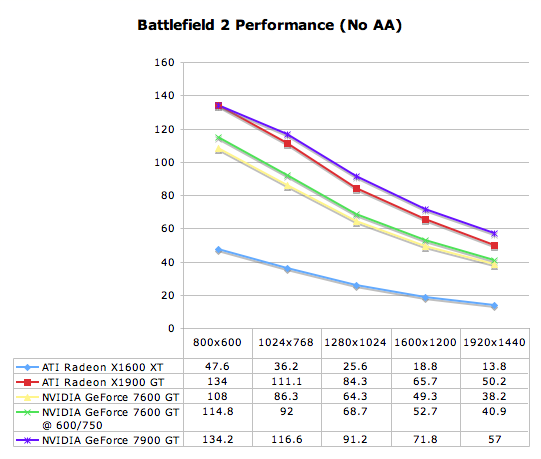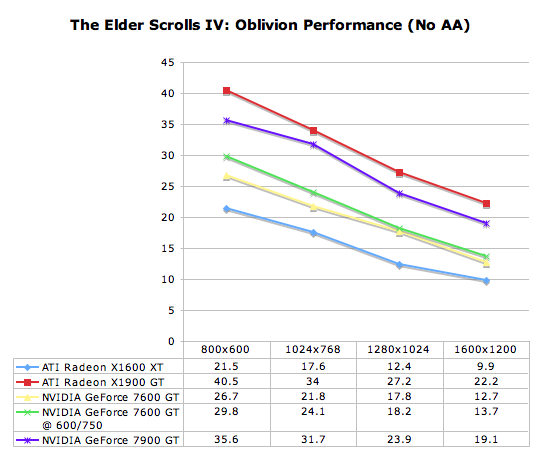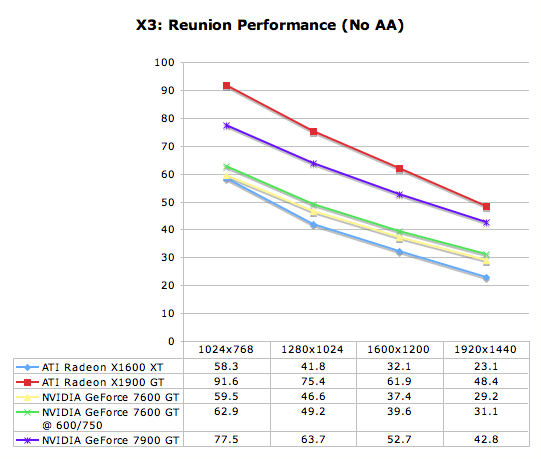Factory Overclocked: GeForce 7600 GT
Our different flavors of 7600 GT are not as varied. We were only able to find two different clock speed configurations for this class of card coming as only slightly overclocked. The stock core speed is 560 MHz, but the majority of variants come in at either 580 or 600 MHz. As this isn't a very large difference, we decided to only test one core overclock at the high 600 MHz speed. As far as memory goes, stock clock speed is 700 MHz (giving a 1400 MHz effective data rate). We increased our stock memory speed up to 750 MHz giving us 600/750 clock speeds for our test.

Right off the bat, we see that the overclocked 7600 GT variants don't make nearly the difference as the overclocked 7900 GT cards we have. There is a slight increase in performance, but we aren't able to come anywhere near the performance of the X1900 GT. These 600/750 clocked 7600 GT cards will be in nearly direct price competition with the X1900 GT, so we can clearly not recommend them based on BF2.

With Oblivion, we still don't see a large increase in performance, and with the variance in our testing its clear that spending extra money on an overclocked 7600 GT doesn't net any dramatic gains.

Our X3: reunion numbers stand to bring home the point that has been made with our other two tests -- overclocked 7600 GT cards don't add much value and really aren't worth more money. If you're willing to spend an extra $30 for a 10% overclock, it makes even more sense to add another $30 or so and get the much faster performance offered by the X1900 GT; it doesn't make sense not to take the plunge if it's in the budget.
Clearly the 7600 GT doesn't benefit from the same advantages that the 7900 GT does when it comes to factory overclocked performance. The results in the remaining tests did not provide any new information: the roughly 10% overclock can improve performance by up to 10%, but the gap between the 7600 GT and the faster cards remains quite large.










74 Comments
View All Comments
augiem - Thursday, August 10, 2006 - link
I wonder which of these cards would accelerate Maya's 3D viewport performance the most...PrinceGaz - Thursday, August 10, 2006 - link
If you're a casual Maya user, then look at the OpenGL performance (Quake 4) for a rough guide. I'm tempted to think though that the GeForce cards should still have the edge in most OpenGL situations so Quake 4 might not be representative.If you use Maya professionally, then none of the cards looked at are for you. A good Quadro or FireGL card will render scenes far faster than any consumer card, and as time is money, will more than pay for itself despite their high cost if that is what you do for a living.
Calin - Friday, August 11, 2006 - link
There was a time when it was possible (although not very easy) to mod a Radeon 9700 into the corresponding FireGL card. This would have been great for you (but now a FireGL based on 9700 could be slower than consumer cards)PrinceGaz - Thursday, August 10, 2006 - link
I've only read the first two pages of the article up to and including the list of prices for the various cards at the bottom of the second page, and haven't read any comments here, but it seems pretty obvious already that the X1900GT is going to be the obvious winner in terms of value for money.I'll be back in half an hour or so after I've read the rest of it.
Gondorff - Friday, August 11, 2006 - link
Indeed, the X1900GT looks very good... which makes me very happy b/c I just bought it a week or so ago (damned slow shipping though...). For those who do care about rebates, the x1900gt can be had on newegg for $200 right now (a connect3d one). I was lucky and got it at $175 before they raised the price... for $15 more than the 7600gt I was going to get otherwise, that's pretty damn good if I may say so myself.Anyway... excellent article; if only it were out earlier so I could worry less about a slightly blind choice... but c'est la vie and it turned out well anyway :).
Kougar - Thursday, August 17, 2006 - link
Good grief, I just found it for $199... and it was previously $175!? Incredible... :(PrinceGaz - Thursday, August 10, 2006 - link
Yep, pretty much as I suspected- the X1900GT is best at stock speeds. Things become a little blurred when factory-overclocked 7900GTs are brought into the picture but while they're faster, they're also more expensive by a similar amount. Both offer great value for money if you need to buy a card now.One thing the article seemed to overlook is that many people who visit sites like this will overclock cards themselves, factory overclocked or not, and this is likely to reduce the advantage of already overclocked cards like the 7900GTs you recommend. I imagine there is a bit more headroom in a stock X1900GT than a factory overclocked 7900GT (especially a 7900GT with a core clock of 580 like you used). Those of us willing to take a chance on how much extra a card has available may well find a user-overclocked X1900GT to be a match for what an overclocked (user or factory) 7900GT can achieve.
coldpower27 - Friday, August 11, 2006 - link
The problem with this is that your using assume performance vs guranteed performance of factory overclocked units, so they aren't comparable.
The point provided is something to keep in mind, but shouldn't be recommended for anyone other then those who know what they are doing. Not to mention the voiding of the warranty when you do when you suggest.
DerekWilson - Friday, August 11, 2006 - link
Also, if you look around, increasing voltage and cooling for 7900 GT cards can yeild results better than a 7900 GTX. Buying a factory overclocked 7900 GT gives you a card that a manufacturer binned as a part that is able to hit higher than stock clocks at stock voltage and temperature. So you should get a more easily overclockable card if you really want to push it to its limits.Genx87 - Thursday, August 10, 2006 - link
2nd from the top for ATI is considered mid grade?Guess that 7950GX2 is pushing them down from the top.